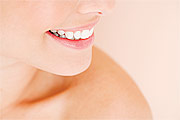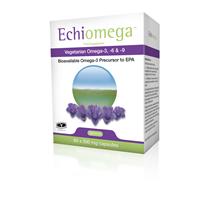 In an exclusive interview model,make up artist and beauty expert, Jemma Kidd discusses her beauty regime.
In an exclusive interview model,make up artist and beauty expert, Jemma Kidd discusses her beauty regime.
Recently appointed as a Beauty Ambassador for Udo’s Choice Ultimate Oil Blend, she explains why she has been a fan of this special oil for many years:
How did you get started in the beauty industry?
I started out in the industry as a model, but I was never really comfortable – unlike my little sister Jodie! When I discovered what it was like being on the other end of the make-up brush, I knew I’d found the right career. I was lucky to work as an assistant to make-up supremo Mary Greenwell for five years then, in 1999, I was spotted by Premier Hair and Make Up Agency and taken on their books. Since then I’ve worked with leading fashion designers, photographers and a host of prestigious magazines, including American and British Vogue, Vanity Fair and Elle. I also have a weekly beauty column in the Mail on Sunday’s YOU magazine.
In 2003, I founded an academy in London to train professional make-up artists that also offers a range of make-up workshops for women of all ages and have created three distinctive make-up ranges – Jemma Kidd Make Up School, Jemma Kidd PRO and JK Jemma Kidd – which are now sold throughout the UK and overseas.
You started your career as a model – what prompted you to switch to becoming a make-up artist?
I have always been creative and found myself watching the make-up artists backstage, wanting to know all of their secrets. I felt more at home behind the scenes than on the catwalk – the vibe, the buzz, the people – I just loved it. In retrospect, modelling was the best training I could have had. I learned from incredible artists, but I also know the feeling of having make-up applied badly
Why did you decide to start your own make-up school?
Establishing the Jemma Kidd Make Up School was an idea that came to me after a girl flew over from Deli to be taught by me for a week so that she could work in Bollywood. When I was a session make-up artist I used to get inundated with requests from friends to do their make-up and was constantly asked by mothers to show their daughters how to apply it correctly. I soon realised that millions of women wear make-up, but very few of them have been taught how to apply it and I felt that there was a need for a place where women could come and learn about make-up without the pressure to buy.
Nutritionists often quote the phrase: “Beauty comes from within”. Do you believe that nutrition can play an important role in how a person’s skin looks?
Absolutely! Good skincare and make-up can help improve the appearance of your complexion and help mask any problems, but healthy habits will make your skin glow naturally. I always try to eat well, drink lots of fresh fruit/veg juices, keep my intake of Omega 3 and 6 Essential Fatty Acids up, sleep for at least eight hours per night (which is incredibly difficult with twin toddlers!), try to improve my digestion, and party in moderation. I’m a firm believer that beauty really does come from within and that the key is a healthy gut.
When did you first become interested in nutrition?
Nutrition is an important part of looking good, so I have been researching and learning about it for a long time as a part of my work in the beauty world. I have had a few problems over the years with my digestive system and feeling exhausted all the time with so much travelling – I was drowning myself in teas, coffees, and sweet foods to try and get more energy. It wasn’t until I went to see a nutritionist that I realised what I was doing wouldn’t help, and that getting a healthy diet and taking the correct vitamins and supplements would make me feel so much better. She was right of course! Now I only eat foods that suit my body and the change is extraordinary – I feel like a new person. All it took was cutting out a few foods and taking a few supplements.
We aren’t taught very much about nutrition in schools these days. At your Make Up School do you ever see women with dry skin conditions who are trying to mask this rather than tackle the causes? What advice do you tend to offer them?
One of the most common mistakes I see at the Academy is women attempting to apply make-up to dehydrated skin. It’s hugely important to create an even complexion before applying colour products so that skin doesn’t end up looking blotchy. In terms of skincare, I advise taking time to prep skin thoroughly – moisturise well and use a hydrating serum under foundation, which will act as a barrier against water loss. I also suggest opting for liquid and crème formulas as opposed to powders which can draw attention to any dry or flaky patches. Of course it’s also vital to tackle the root cause of dehydration by drinking lots of fluids throughout the day and Udo’s Oil is a big help here keeping skin moisturised from the inside. If I feel it’s a deeper problem, I advise them to see a nutritionist.
What are the key messages you try to convey to your students at the Make Up School with regards to beauty?
Make-up shouldn’t be used as a mask – it’s more of an enhancer. Good skin comes from within, so what we put in our bodies is reflected in how we look. We teach our students how to handle problem skin and how to enhance their complexions with the power of make-up tips and techniques.
Have you always been interested in natural products?
I’m a huge believer in natural products, even more so now that I’ve had kids. I feed them and my husband the most natural organic foods I can, and I only use organic natural shampoos, body creams, suncreams, nappy creams and toothpastes. I also use homeopathy for problems like teething, irritability and colds.
When did you first hear about Udo’s Oil and how were you introduced to it?
“Now I can use make up to enhance my features rather than mask them”
When you research and read about achieving perfect skin (which is one of my quests in life!), one thing that comes back time and time again is that it is essential to have a good source of Omega-3, 6 and 9. This was where I came across Udo’s, as it’s the most effective way to get all three. I found it in my local independent health food store and once I started taking it, I could feel and see an improvement almost instantly – not only in my skin, but also in my hair and nails. I rarely get skin blemishes now and my concealer has virtually been made redundant! Now I can use make up to enhance my features rather than mask them.
How do you take Udo’s Oil?
I put it on a salad at lunch, or in a fruit/veg juice in the morning. If I’m in a hurry, I mix it with apple juice and down it!
You are a new mum – has Udo’s Oil helped you in any way?
I give my babies a small amount most days, as I want to give them the best start in life and Udo’s Oil will help their development. Having babies puts a huge amount of pressure on your body and I felt depleted after giving birth. I completely came off any diet and ate whatever my body craved. And the one thing I really craved (other than bucket-loads of pasta!) was Udo’s Oil. I think that shows how much my body needed it.
Omega 3 and 6 are depleted in mums as they have to share them with their growing baby and this can lead to dry skin, stretch marks and low energy. This continues after birth if breastfeeding too so Udo’s Oil is great for boosting the amount of Omegas for both mum and child.
What has been your career highlight to date?
Right from the start of my career it was always my dream to create a make-up line, so launching the Jemma Kidd Make Up School range was a huge achievement. I spent months developing each single eyeshadow colour to make sure they were perfect – it became my complete passion.
What ambitions do you still have for you and for your Make Up School?
I have so many ideas and passions I want to fulfil, starting a foundation to help educate under-privileged children is one. We’re always looking to expand the Jemma Kidd Make Up School brand and bring it to new audiences and markets across the world. At the moment, all my energy is focused on our latest venture called Jemma Kidd masterclass@HOME, which aims to bring the professional step-by-step tuition available at the Jemma Kidd Make Up School to people’s homes nationwide.
More info on Udo’s Choice Ultimate Oil Blend
Udo’s Choice Ultimate Oil Blend is a blend of organic seed oils that provide all the Essential Fatty Acids, Omega 3 and 6 we require daily in the ideal ratio of 2:1. Udo’s Oil is easily mixed in with food and drink to incorporate these essential fats into our diets. Recipes and more information can be found at www.udoschoice.co.uk
Ingredients:
Flax seed oil*, sunflower seed oil*, sesame seed oil*, coconut oil*, evening primrose oil* (13 mg gla/15 ml), soy lecithin, rice bran and rice germ oils, oat bran and oat germ* oils, mixed tocopherols: the oils in this blend supply a range of fatty acids including 2:1:1 ratio of Omega 3, 6 and 9.
* certified organic



 After the big ‘fat is bad’ push of the 1980s and 1990s, we are finally coming around to the idea that some fats are good for us.
After the big ‘fat is bad’ push of the 1980s and 1990s, we are finally coming around to the idea that some fats are good for us.![FB-Salmon-w-Marinated-Crudites_p [640x480].jpg](https://www.elixirnews.com/assets_c/2010/09/FB-Salmon-w-Marinated-Crudites_p [640x480]-thumb-480x480-222.jpg)

